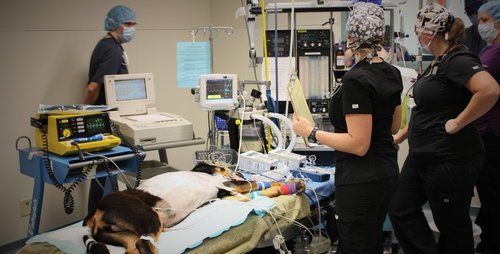Dilated Cardiomyopathy in Dogs

Overview
Just like humans, dogs can have heart issues. One such issue is dilated cardiomyopathy. If your dog has been diagnosed with this condition you may want to know more about it. What causes it, what can be done to treat it, and what you can do to help your dog be more comfortable. Here is more on dilated cardiomyopathy in dogs so you have more information to put your mind at ease.
What is Dilated Cardiomyopathy in Dogs?
This is a condition that affects the dog’s heart. It can lead to heart failure and is a common issue in some of the larger breeds. As mentioned by VCA Hospitals:
Cardiomyopathy is defined as degeneration of the heart muscle. As a result of this degeneration, the muscle becomes thinner, particularly the thick muscle wall of the left ventricle. The pressure of the blood inside the heart causes these thin walls to stretch resulting in a much larger heart. This condition is described as dilated cardiomyopathy (DCM).
What Dogs Does It Affect?
While there is a possibility of any breed getting this condition, there are specific breeds that are more likely or predisposed in getting dilated cardiomyopathy. These include:
This is typically found in larger breeds as mentioned but as you can see by the Cocker Spaniel, it can happen in smaller dogs too.
What Are the Symptoms?
This can be a slow acting disease so at first, there may not be many signs to be aware of. But one of the first ones is an intolerance to exercise. With a veterinarian’s exam, they may notice an abnormal heartbeat or heart murmur but these are often found after the condition has been progressing, not at the onset.
As time goes by, the heart will have a harder time pumping blood and this leads to an increase in blood pressure. This may be on one side of the heart or even both sides. As this happens, there may be lung congestion as well as fluid buildup behind the atrium or left ventricle. Another place that fluid may build up is in the abdomen, which is known as ascites. The lungs are another area and this fluid buildup is called pleural effusion. This happens if the right side of the heart is affected with the disease. Once the dog is at this stage, you may see the dog experiencing fainting episodes and/or weakness. In some cases, dogs may go into heart failure even without the clinical signs mentioned.
Heart failure may present itself after an extended time with this condition. According to Vet Med at Washington State University:
Dogs with heart failure caused by DCM often show signs of left-sided congestive failure. These include reduced exercise ability and tiring quickly, increased breathing rate or effort for the level of their activity excess panting, and cough (especially with activity). Sometimes the cough seems soft, like the dog is clearing its throat. Poor heart pumping ability and arrhythmia can cause episodes of sudden weakness, fainting, or sudden death as noted above. Some dogs with DCM experience abdominal enlargement or heavy breathing because of fluid accumulation in the abdomen or chest, respectively. Presence of any of these signs should prompt a visit to your veterinarian to determine if heart failure (or another disease) has developed.
Other symptoms include:
- Rapid breathing
- Quiet, depressed-acting, non-interactive
- Hard time breathing
- Distended stomach
- Restless sleeping
- Weight loss
- Gagging or coughing
- Fainting (as mentioned)
- Sudden death
How Is It Diagnosed?
The vet can use echocardiography to diagnose dilated cardiomyopathy. This shows the indices of minimized pump function and chamber dilation. The pulmonary vessels and tissues is looked at through thoracic radiography which shows if there is fluid in the lungs. In some cases, electrocardiography shows the heart rhythm which can rule out other causes of the symptoms such as arrhythmia. Sometimes a vet will need to perform a 24-hour electrocardiogram which gives them insight into the dog’s cardiac rhythm.
All of these tests may be necessary which is why it is a good idea to have pet insurance if your dog has this condition or is displaying symptoms that may be dilated cardiomyopathy.
Other diagnosis methods include:
- Blood and urine tests
- ProBNP. This is a specific blood test meant to check the protein levels that affect the heart.
- Ultrasound
- Holter monitor. This measures the dog’s heart rate and is a piece of machinery the dog wears for 24 hours. It checks for abnormalities in their heart rate and rhythm.
The Prognosis for Dogs With Dilated Cardiomyopathy
The prognosis for dogs with this disease is not always a positive one. It does however, depend on the rate of which the disease has progressed and even the type of dog. For instance, some breeds have a less favorable prognosis such as the Doberman. Other dogs have a much slower progression as seen in the Cocker Spaniel. Of course, those dogs that are in congestive heart failure have the least favorable prognosis but it still depends and nothing is set in stone.
Treatment Methods
Treatment methods vary depending on the dog and what is needed but here are some common treatment methods:
- Diuretics
- Angiotensin converting enzyme (ACE) inhibitors
- Cardiac glycosides
- Vasodilators
- Bronchodilators
- Anti-arrhythmic drugs
- Pimobendan
Your vet will be able to recommend which is the best treatment for your dog so he can live longer and happier.
Cost to Treat: Heart surgery to correct dilated cardiomyopathy will cost $10,000 to $20,000 depending on your dogs breed and the severity of the problem.
Other Heart Conditions in Dogs
- Aortic Stenosis
- Boxer Cardiomyopathy
- Cardiac Issues
- Ductus Arteriosus
- Heart Disease
- Heart Murmur
- Mitral Valve Disease
- Pulmonic Stenosis
- Sick Sinus Syndrome
Related Content


















